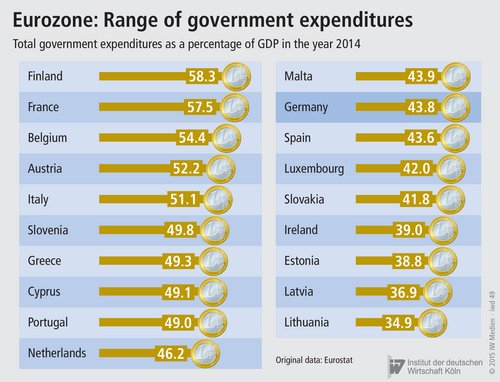The leading heads of various EU institutions want to transfer more powers from the national to the European level. What speaks against these plans, however, is the fact that the different strategies in the individual Eurozone countries are nearly impossible to reconcile in terms of economic and social policy.
Eurozone: Don’t shake the powers that be
Debt crisis, weak growth, fear of deflation – there are many things that don’t run smoothly in the Eurozone. While searching for a solution to the main problems, more and more policymakers are focusing on stronger economic and politico-economic integration.
The European Central Bank (ECB), for example, is calling for a European treasury that would serve as a counterpart to the ECB as a monetary authority. The French Minister of the Economy, Emmanuel Macros, is even petitioning for a European government that would have its own budget and help shape labour market policy in the Eurozone.
And the President of the European Commission, Jean-Claude Juncker – in cooperation with his colleagues from other EU institutions – has promoted steps towards both a budgetary union and a political union. In the longer term, the EU institutions would also need to receive some funds for cushioning economic shocks in the Eurozone countries.
Such transfers of responsibility would at most be worth considering if the member countries were largely on the same wavelength in terms of economic and financial policy. Only then would there be little risk of centralised decisions going against the interests of many Eurozone countries and their citizens.
The differences between these countries, however, are in fact great – for instance, when it comes to the government’s role in economic policy. Examples include:
- Government expenditures. The Eurozone shows a strong downward slope in regard to the distribution of resources between the government and the private sector (see chart): In Finland and France, the government expenditures in the year 2014 represented nearly 60 per cent of the economic output – while in the three Baltic states and in Ireland, the figure is less than 40 per cent. Additionally, the margin between the Eurozone countries has increased further over the past 15 years.
- Social welfare. Major differences are also evident in the role of the welfare state. While nearly 32 per cent of France’s gross domestic product (GDP) was spent on social welfare in 2012, the figure for Estonia is barely 14 per cent.
- Subsidies. Funding policy also exhibits a great margin within the Eurozone. In the year 2014, the highest subsidies were in Belgium, with 2.9 per cent of the GDP, and the lowest were in Lithuania, at 0.3 per cent.
All of this demonstrates how very difficult it is to find a common ground in the area of national preferences within the Eurozone. Hence, it is with good reason that economic and social policy has largely remained in the hand of the member countries. In spite of the many acute problems, this authority should not be shaken.

Berliner Gespräche Frühjahrstagung: Zwischen Sicherheitspolitik, Green Deal und Wettbewerbsfähigkeit – eine europapolitische Bestandsaufnahme
Das Institut der deutschen Wirtschaft möchte Sie erneut zu einer virtuellen Variante der „Berliner Gespräche” einladen.
IW
Die Zukunft Europas: Welche Prioritäten sind für die Wettbewerbsfähigkeit entscheidend?
Die Europäische Union hat ihre neue strategische Agenda für die Jahre 2024 bis 2029 veröffentlicht. IW-Direktor Michael Hüther und HRI-Präsident Bert Rürup analysieren im Handelsblatt-Podcast „Economic Challenges” die Bedeutung der Wettbewerbsfähigkeit für die ...
IW
